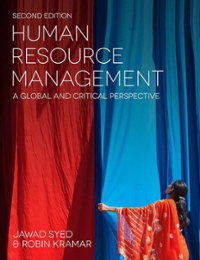When Joshua secured a job as a junior staffer with a senior Australian government minister, he was
Question:
When Joshua secured a job as a junior staffer with a senior Australian government minister, he was delighted. The industrious 27 -year-old had studied economics, prior to gaining experience in marketing and working for a NSW State Government electoral office. Moving to Canberra was a great adventure for Joshua, and he looked forward to gaining experience working with this prestigious politician. He was familiar with the long hours and travel customary in politics, and this did not faze him.
The ministerial office had approximately 20 staff, divided into policy, admin, media, and political teams. The office was led by a Chief of Staff (the equivalent of the CEO) and a Deputy-Chief of Staff.
However, from day one Joshua's experience was extraordinary. After being approached via political contacts, Joshua submitted a resume and had interviews with the politician and approximately three other senior staff. Aside from this, there were no other selection criteria or process around the appointment.
There was no job specification, no job description, and no induction. Upon entering the office, Joshua was shown his desk and not introduced to any other staff. His direct supervisor, the Chief of Staff, hardly spoke to him. There wasn't even an introduction during that day's staff meeting.
Over time, through taking the initiative and speaking to feliow staff, Joshua was able to create a role. Unfortunately, the seemingly disorganised entry into the office was symbolic of its general organisation and leadership.
Performance reviews were quarterly meetings with the Chief of Staff. The hectic nature of politics meant that they were often very short or cancelled altogether. Additionally, it was not a formal process, with no agenda to begin with and no follow up.
Joshua found in his first year that he was required to travel to all domestic locations with the politician, working 40 weekends out of 52 on over 150 trips. Whilst the travel was a privilege, the lack of staff rotation or coherent office strategy began to drain and distress Joshua.
Moreover, he rarely had constructive feedback from his supervisor. Formal performance review systems are entirely organised by the Chief of Staff in political offices - there was no accountability more broadly within the Government.
As time progressed, the chaos and negative atmosphere appeared to become evident even to the general public. The job of the Chief of Staff is to give feedback and advice not only to subordinates but also to the politician This particular chief of staff did neither.
Joshua began to worry that the politician might lose his job and as a consequence the whole office would lose their jobs. He started to look for other opportunities and was quickly offered a job back in Sydney working for another senior minister.
Five months later, the Minister was dumped in reshuffle and the entire office lost their jobs.
Questions
1 Describe the major human resource management issues in this office?
2 If you were responsible for human resources in this office, how would you have handled this situation?
3 Define the role of objectives and feedback in this case?
4 Discuss the process you might implement to strengthen the performance management process in the office?
Step by Step Answer:

Human Resource Management A Global And Critical Perspective
ISBN: 9781137521620
2nd Edition
Authors: Jawad Syed, J; Kramar Syed, Robin Kramar





